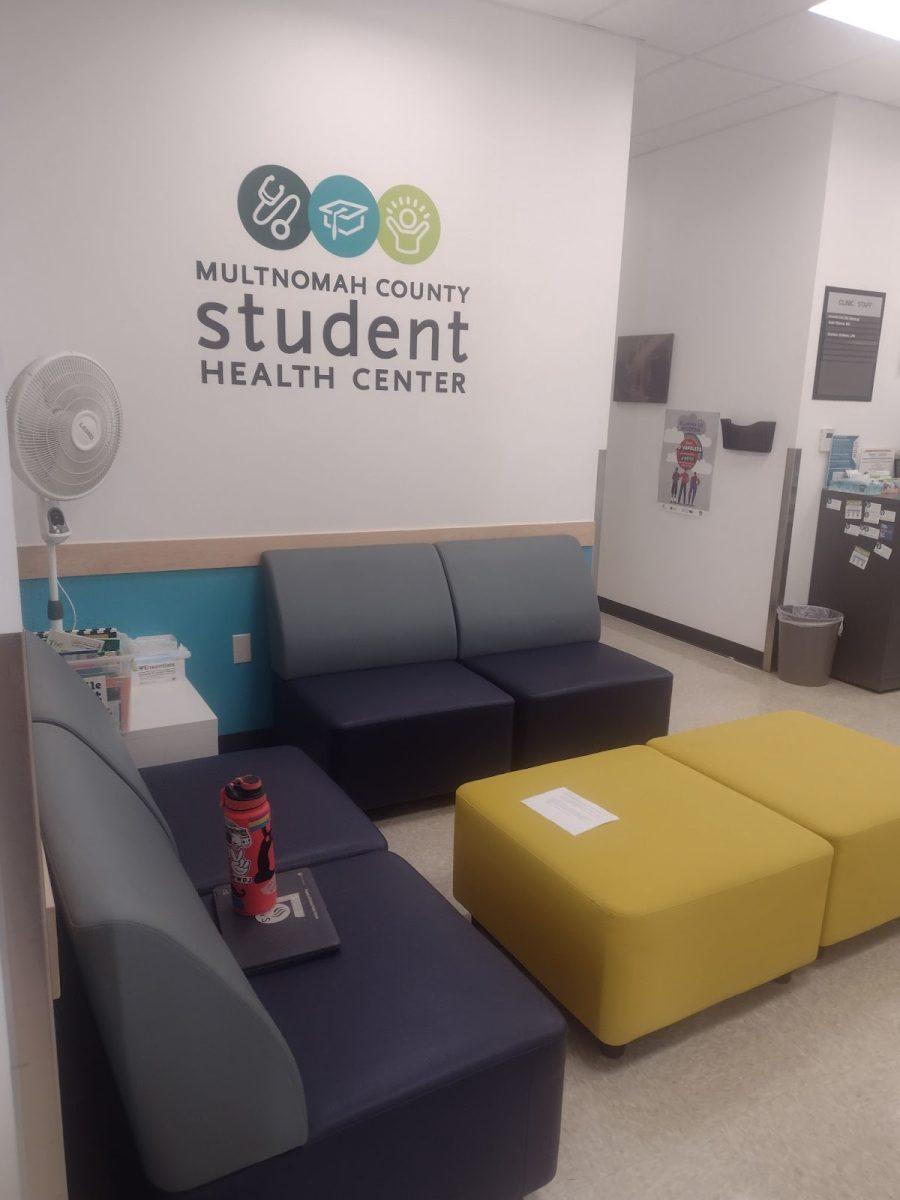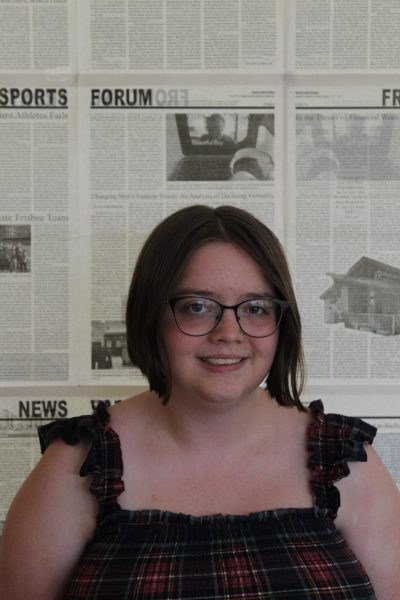Franklin High School is chock full of programs and resources made solely for students. These resources are available to help students with a variety of things, and yet so few are used, or even known about.
One such resource is the oft-forgotten Student Health Center (which would remain open during the potential teachers strike). Walk past the nurse’s office, take a right at the vault, and turn left just before the exit doors to find the center. Due to its obscure location hidden in the M wing on the first floor, many students are unaware of its existence and all that the center offers.
What does the Health Center offer? Turns out, a lot. Amanda Cort (she/they), a nurse practitioner at the Franklin Student Health Center, explains: “We’re a full service primary care clinic, so we offer basically everything you could get at your doctor’s office.” This includes vaccines, lab testing, injury treatment, access to condoms and contraception, STI treatments, and more. Medications can also be ordered through the clinic and delivered there instead of to an outside pharmacy. Cort says she thinks one of the most underutilized resources in the clinic is access to Narcan, which is a medication that can reverse opioid overdoses. Any student can come into the clinic and get it for free. Cort believes that “with all the fentanyl in our community […] I think we all need to be prepared, and I have [this medication] here, waiting for you […] I’ll teach you how to use it, and then you’ll have that resource. You could be the hero that saves someone’s life.”
Narcan isn’t the only thing the clinic will hand out for free; reproductive and sexual health products can also be found in the clinic. Menstrual products, including pads, tampons, and even menstrual cups are available completely for free. Beyond menstrual products there are ‘family planning’ related products and care that one can receive. Almost every method of birth control is available without cost in the clinic; Nexplanon, a stick that goes in your arm, both copper and hormonal IUDs, regular injections such as Depo-Provera, hormonal pills, patches, and rings are all accessible. “A lot of [the] methods that we have can stop that monthly bleeding from occurring […] so if that’s ever of interest to people that’s another option we can always talk about,” Cort explains. They add, “The IUD can last for up to eight years, and the Nexplanon in your arm can last for four years. So you could get all the way through college fully protected.” Cort wishes she “was putting in more IUDs, because they have the highest rate of patient satisfaction of any method, and we can do it right here in the clinic.”
The clinic also offers mental health care. Cort says, “People come to see us who are experiencing stress, anxiety, [or] depression.” She continues, saying they “do a lot of evaluations for folks if they’re wondering about ADHD or other medical or mental health conditions.” Cort even offers craniosacral therapy at the clinic, which is a massage technique that uses a light touch to release tension around the body’s connective tissue network (called the fascia), or in their words, “[it’s] a very sort of gentle, relaxation bodywork technique that I think everyone in the world would benefit from… many students, once they have tried it they love it, and they request it.”
Some students worry about confidentiality when receiving healthcare, but Cort says, “One of the most special things about our setting, [is] that we’re able to really provide confidential services in a way that can be awkward at your primary clinic when your parent’s right there.” She also shared the legal confidentiality rules the clinic abides by: “We can offer family planning confidentiality, [including] sexually transmitted infections, or birth control, or just education, anything in that realm at any age.” Mental health services can be kept confidential if you’re fourteen or older, and at fifteen all services the clinic offers can be kept confidential, and you can sign for your own treatment. They clarify: “That’s not to say I don’t want your parents or adults to be involved in your care, I really do, but I understand that it’s complicated sometimes.”
Cort says not enough people know about the Health Center. “We don’t really have a budget for outreach, marketing, [or] advertising.” Lack of student awareness about the Health Center is a shame, laments Cort, since: “[The Health Center is] really special as adolescent health care… [I]f you’re a teenager and you need health care, this is the best place to go.” Cort wants more Franklin students coming in: “I love my job, I love seeing kids, I love that you’re never in trouble when you come here,” says Cort. “My job is just to help you live your best life… I would love to […] support you on your journey.” The clinic has same day appointments every single day. The easiest way to make an appointment, Cort remarks, is probably to just walk in. You can also call 503-988-3370 and get in touch with the center’s receptionist. In-person, phone and video appointments are available, and the clinic is open 7:45 a.m. to 3:45 p.m. Mondays, Tuesdays, Thursdays, and Fridays, 9:15 a.m. to 5:15 p.m. on Wednesdays, and closed for lunch: 12:20 p.m. to 12:50 p.m. daily.
A more known, though also underutilized resource is our very own Franklin library. Besides physical books, the library offers access to eBooks, audiobooks, and even a streaming movie library. Recently added noise reduction earmuffs are available for people to use when they’re feeling overwhelmed by too much noise, and can be borrowed at the library desk. The library is also partnered with the Multnomah County Library to provide every Franklin student with a library card, which provides access to all county library resources. This includes thousands of eBooks and audiobooks, 147 research databases, the New York Times and Wall Street Journal online, streaming movies through the Kanopy website or app, and manga through the Hoopla app, according to Ayn Frazee, teacher librarian. Frazee says that with this library card it is also possible to reserve the ‘My Discovery Pass,’ which you can use to get free tickets to Portland Art Museum, the Japanese Garden, the opera, and this year even passes to Rose City Comic Con. Frazee explained that the login information is just 01 followed by your student ID number, and the password is just your birthday in mm/dd/yyyy format. She encourages students who have trouble with their log in to come seek assistance from her. Frazee said she would love for the library to get more use, adding “a busy library is a happy library.” The library is open 8 a.m. to 5 p.m. on Mondays, Wednesdays, and Thursdays, 8 a.m. to 3:45 p.m. on Tuesdays, and 8 a.m. to 4 p.m. on Friday.
Another resource for students is the Schools Uniting Neighborhoods (SUN) program. According to the Franklin SUN website, the program offers free “educational support and skill development for youth and adults, enrichment and recreational activities, family involvement and support, social, health, and mental health resources, family and community events, food resources, school and learning supplies, hygiene and cleaning supplies, and utility assistance.” Franklin SUN provides tutoring available to everyone in the library after school on Wednesdays and Thursdays from 3:30 p.m. to 5:15 p.m. for drop-in help or quiet work time. Tutoring is also available for English as a Second Language (ESL) students. Frazee adds that “SUN Tutoring is an awesome opportunity to get one on one help with school work, but I only see a handful of students taking advantage of the service usually.”
The Health Center, library, and SUN programs are barely a glimpse of all that’s available to Franklin students. Woodstock Laundry via Laundry Love, offers free laundry service. SUN’s backpack program will let students bring home groceries for free biweekly. SUN offers support for utilities and rent payments. There are so many programs and resources available to help students; all that’s necessary is signing up, dropping by, or walking down to the Health Center.



































